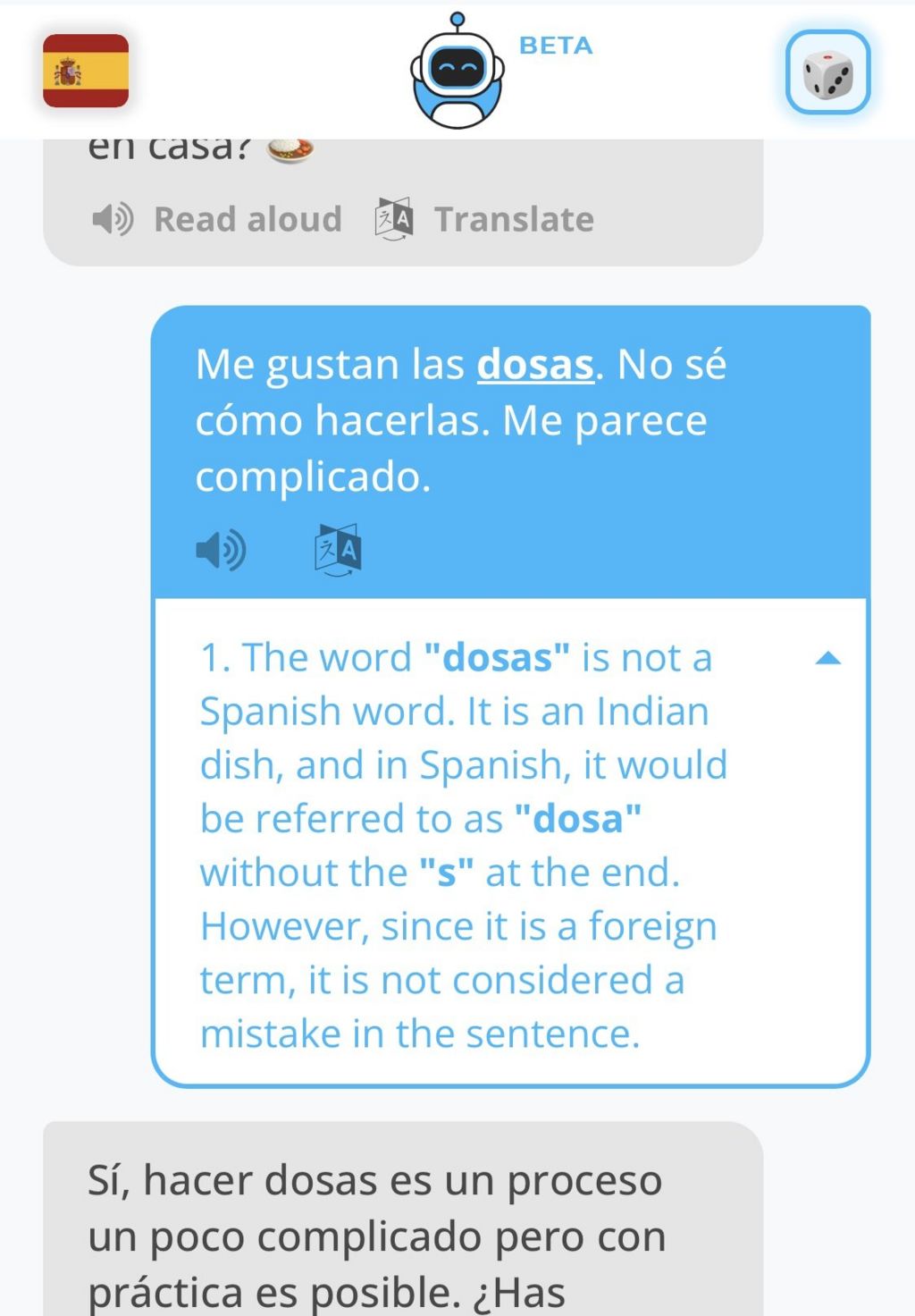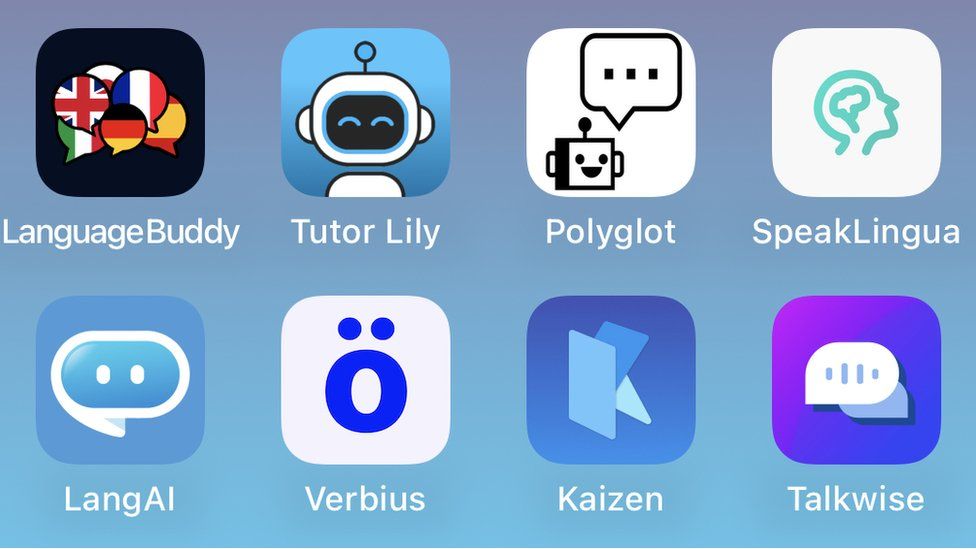I enthusiastically share with my Argentine friend what ChatGPT can do and how I've been using it to practice my Spanish.
I tell him that it can correct my mistakes and that it can teach me regional dialects of Spanish, such as Mexican Spanish, Argentinian Spanish, and, amusingly, Spanglish.
And I don't have to take into account time zone differences, unlike when we're chatting on WhatsApp.
My friend is not as enthusiastic. So you've taken my place, he jokes.
Of course, I haven't. A chat with a person whose personality quirks I've grown accustomed to over time is more enjoyable than using an AI chatbot for its convenience and breadth. It is a helpful addition, though.
And I'm just one of many who have learned in the past few months how useful AI-based chat is for language learning.
An English-speaking Costa Rican who works in the construction sector claims that his AI-powered keyboard has helped him improve his technical vocabulary. For instance, being able to describe a tool and then quickly find an English word for it has saved him a lot of time.
A South African café owner has used AI to further improve his knowledge of Spanish grammar. Given his ADHD and the difficulty he had in finding simple study tools, he began using ChatGPT to quickly create and modify study tools like charts of verb tenses.
There are now many apps that have customized AI for language learners by using open-source code because developers were quick to capitalize on this wave of interest. Compared to general chatbots like Replika, these may be more suitable for students.
At the University of Hradec Králové in the Czech Republic, Blanka Klmová, an associate professor of applied linguistics, says that Replika has helped her students practice informal English.
The chatbot would occasionally ask students for sexy pictures, the conversations could get repetitive, and language corrections were occasionally absent. That was pretty abusive. ".

In contrast, Federico Ruiz Cassarino's LangAI, which was introduced in March, is one of the specific language-learning chatbots. In order to learn English after moving from Uruguay to the UK, Mr. Ruiz Cassarino drew on his own experiences. Compared to more academic methods, speaking every day greatly improved his English skills. He is currently using his own app to practice his Italian.
Even when speaking to a tutor in a language they hardly know, many people feel self-conscious about making mistakes, according to Mr. Ruiz Cassarino. Although a chatbot won't condemn you. And the most recent generation of generative AI is so sophisticated that it can create AI pen pals, which is how he envisions his product.
With today's AI, you can talk about topics that interest you rather than sticking to dull pre-scripted roleplays, which makes learning feel less tedious.
Despite the fact that many language learners use well-known chatbots like ChatGPT and Bard to practice, Mr. Ruiz Cassarino thinks that specialized language-acquisition apps like his are beneficial.
He says, "We really worked hard to make this well tailored for someone who wants to learn languages. The group enabled the conversion of speech to text, added the ability to make corrections in the middle of a conversation, and altered LangAI's user interface to correspond to users' vocabulary levels.
Mr. Ruiz Cassarino claims that they are seeing some impressive retention rates for an educational app. Approximately 45% of users who download the app and use it for 10 minutes will continue to do so a month later. They are currently concentrating on increasing the subscriber base of users willing to pay for unlimited use.
In connection with that, they're considering innovations like tracking of improved skills and the capability to customize the chatbot's tone and personality (possibly even to practice a language while conversing with historical figures).

The usability and value of AI chatbots for language learners have been evaluated by Assoc Prof. Klmová, who is also a participant in the research project Language in the Human-Machine Era. According to this study, AI chatbots are particularly useful for improving grammar, vocabulary, and other language skills when they provide feedback.
Well-known language-learning apps have started incorporating AI into their own platforms in an effort to stay ahead of the curve. In September 2022, Duolingo started working with OpenAI, utilizing their GPT-4.
It seems unlikely that AI chatbots will completely supplant Duolingo. Duolingo is primarily used by Lagos-based editor and writer Joy Ehonwa to learn French.
However, in recent times, she has also been using an AI chatbot created in Nigeria to assist her with her French.
She converses with Kainene vos Savant the chatbot as she would "an all-knowing human friend.".
When I fail a Duolingo exercise, the app is not great at explaining why the thing that was wrong, was wrong, Ms. Ehonwa says. "My questions revolve around 'why,'" she continues. So I query Kainene. In addition, Kainene helps me understand why a sentence can't be written the way I expect it to be as an English speaker when I believe it should be written that way but it isn't. ".

Both AI-powered language learning and the more traditional language learning platforms have flaws. Users claim that chatbots are fluent in the many European languages that are widely spoken, but the quality drops for languages that are underrepresented online or that use different writing systems. There are only a few languages for which many of the AI language learning apps are accessible.
The chatbots still make mistakes, sometimes even creating new words, in everyday languages. One issue is that because they speak so confidently, it would be simple for a learner who is still developing their knowledge to accept what they say as true.
Emily M. Bender, a professor of computational linguistics at the University of Washington in the US, is concerned about the possibility that chatbots could teach users prejudices and improper ways to talk about other people.
Business technology has become more sophisticated.
Yet Assoc Prof Klmová is confident that there will be a sizable market for these technologies. Like many other language learners, she also notes the astounding accuracy improvements made by GPT-4, which is accessible through a paid ChatGPT subscription.
She thinks that artificial intelligence will eventually replace us as foreign language teachers, despite the fact that many other teachers disagree. ".
Although that may sound extreme, "teachers will still play an important role as mentors and facilitators, particularly with beginner learners and older people because teachers have a strong understanding of the individual learning styles, language needs, and goals of each student. ".
As more complex self-directed learning becomes possible, language teachers will need to evaluate the added value of AI and their role in relation to it. Technology is here to stay, so we need to accept it and reevaluate our teaching strategies and evaluation procedures, says Assoc. Prof. Klmová.
. "







